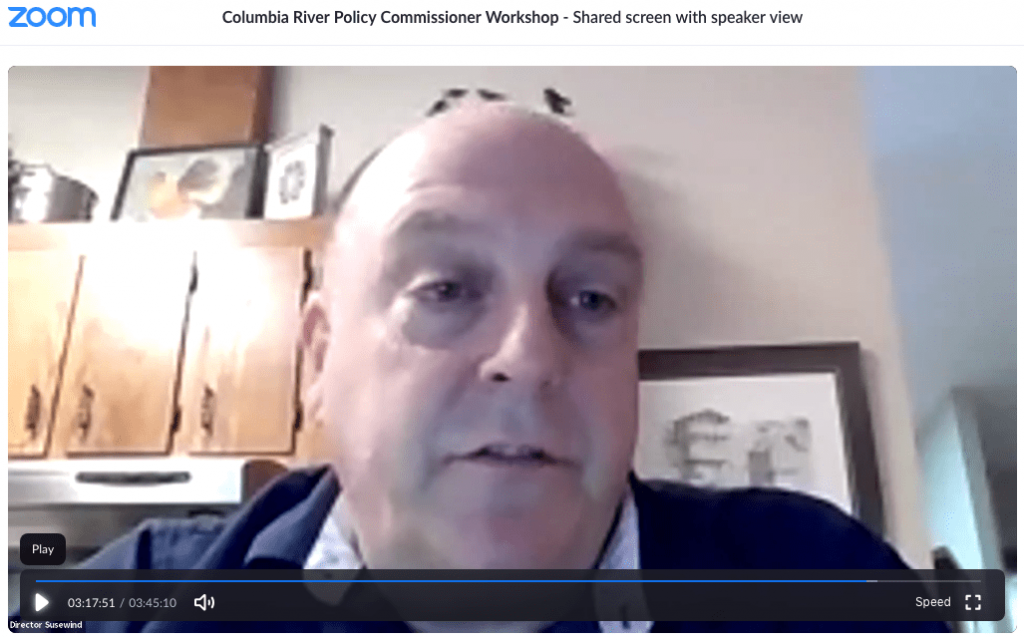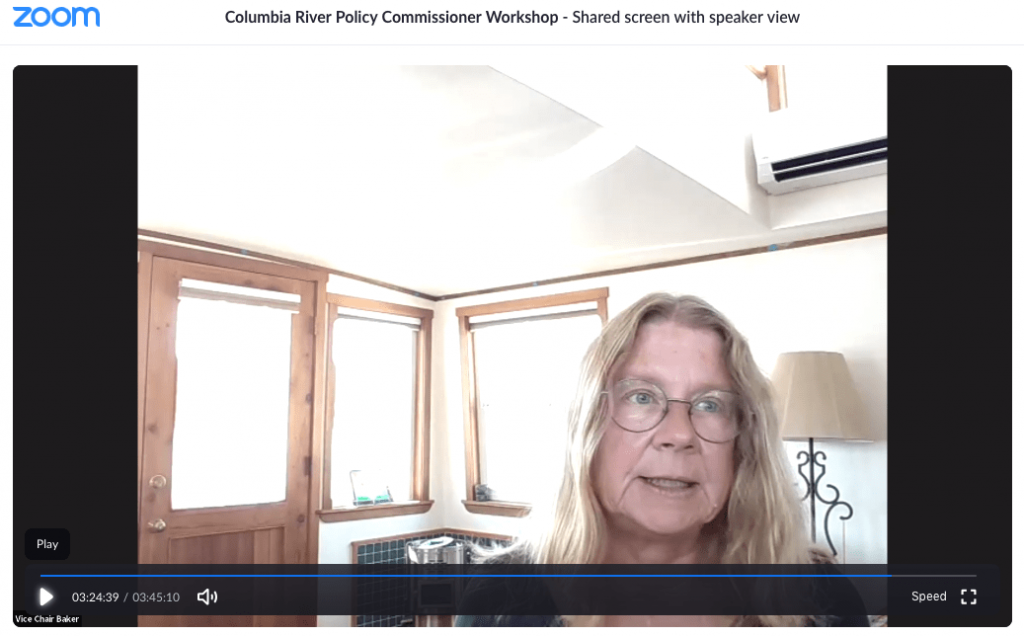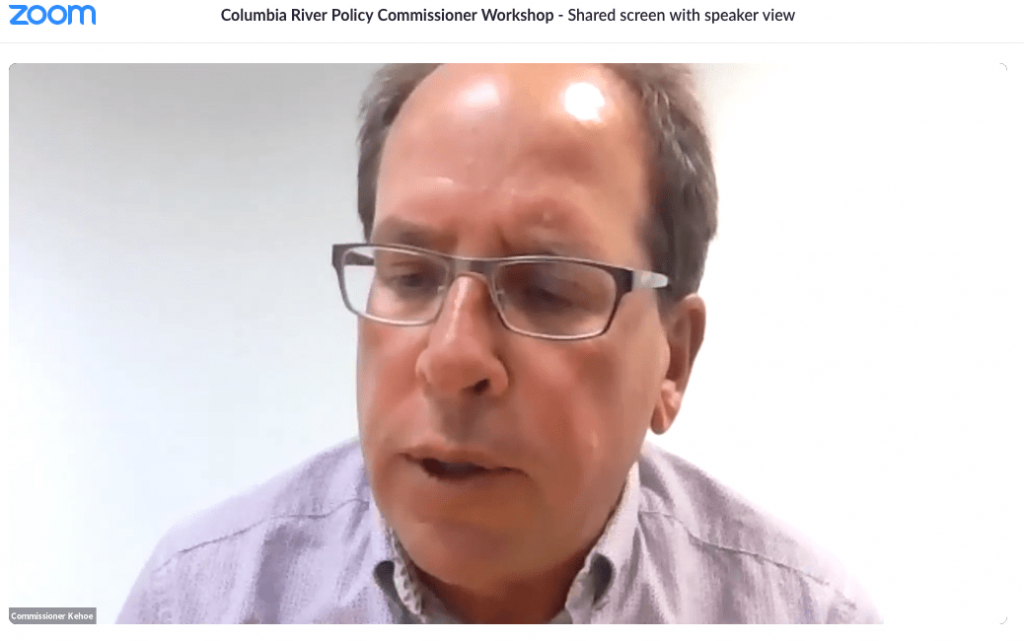
WDFW Commission, Director Talk Columbia Reform Proposals, Options, Potential Fallout Ahead Of Big Vote
Editor’s note: Updated 9:45 a.m., Thursday, September 3, with details on a tribal letter (ninth paragraph from bottom), a slight vote forecast clarification and a corrected first name of a commissioner — my apologies, Brad Smith, for the misspelling.
There isn’t any “no-pain alternative” for WDFW in the state legislature when it comes to a decision expected next week from the Washington Fish and Wildlife Commission that could change Columbia River salmon reform policies.
That was the assessment Director Kelly Susewind made during a Zoom-based special meeting yesterday afternoon with eight members of the nine-person citizen panel that oversees his job.

Proposals centering around altering nontreaty recreational and commercial Chinook allocations and expanding gillnetting on the mainstem to spring and summer stocks are drawing strong pushback not only from the sportfishing and boating world but lawmakers on both sides of the aisle and both chambers.

Twenty-one state representatives last week joined 15 state senators who’d previously expressed their opposition ahead of the expected Sept. 10 vote by the commission.
“We urge you not to abandon the guiding principles of the Oregon-Washington Columbia River fishery reforms. Instead, the Commission should maintain restrictions on mainstem gillnetting and outline a plan that includes clear expectations and benchmarks for the full transition away from gillnets in mainstem fisheries,” their letters conclude.
The hard-won reforms, born in 2012 and 2013, prioritized sport fisheries while moving the commercial fleet to off-channel waters at the mouth of the big river and increasing hatchery salmon production there.
They’ve been on shakier ground as elements were paused or rolled back by the commission.
The 36 lawmakers who signed on to the letters to the commission and director may only represent a quarter of all legislators in Olympia, but some are force multipliers, given their positions in the halls of power.


The list included Sen. Kevin Van De Wege (D-Sequim), chair of the upper chamber’s natural resource committee, which WDFW legislation goes through, and Sen. John Braunn of Chehalis, a Republican budget writing leader.
What’s more – broken record alert – WDFW will once again have its hand out when the long 2021 legislative session convenes as it looks at having to potentially make $23.5 million in operational cuts in response to an estimated $9 billion General Fund shortfall in state coffers due to Covid-19.
To fend those off, the agency is rallying around the idea that the sales tax revenues it receives provide a massive return on investment.
A study WDFW recently cited found that the $94 million it was to receive from the General Fund in the 2017-19 biennium would pour $340 million back into the pot through its support of hunting, fishing, wildlife watching and funds leveraging.

That should resonate with thrifty lawmakers trying to balance the budget. Should.
But we’ve also been down this road before, where a misstep by the commission in March 2019 on Columbia reforms essentially led to the scuttling of a fishing and hunting fee increase that looked like it might pass that year as well as the end of the Columbia salmon and steelhead endorsement, hurting WDFW and impacting upriver fisheries.
All of that was in the background of a question three hours into the meeting from Chair Larry Carpenter, who asked Susewind if adoption of the proposed policy changes would keep WDFW viable and able to do its work.

It’s one of several rocks and several hard places that the director finds himself two years and one month into the job.
“I’ll be honest. I’m going to say it publicly: I hate that people are using our budget as a hostage tool for getting their way on a policy issue as opposed to addressing the policy issue,” Susewind told commission members.
He said it was “purely political” rather than a fisheries, biological or comm-rec question.
In answering Carpenter’s query, Susewind mixed a bit of hedging and evading with a possible hail mary:
“Can we survive it? Yeah, I think we would survive it. Would it hurt us? Yeah, it would hurt us. Is there an option that we come out of this where we don’t have any legislative discontent? I don’t think so.”
With phones seemingly ringing off the hook in the background, ultimately Susewind reiterated that he thought WDFW could manage the outcome, that the issue of equity between the fleets was a commission-level policy decision – and that he also liked the latitude in an idea that Vice Chair Barbara Baker mentioned earlier in the meeting.

Baker joined the commission in January 2017, and in her application packet were letters of recommendations from a pair of state representatives; she had recently retired as the clerk of the House.
She wasn’t around when the reforms were implemented, but acknowledged the “overwhelming opposition to this plan that we’ve heard from the public,” both sides of the legislature weighing in, and input to her from a “very influential tribal member really upset with us and saying that we may be starting Fish Wars over again.”

And then Baker said, “What I’m wondering is if we should at least as an option consider thinking about what’s important to us as a commission and what we could actually agree on rather than going forward with a fractured commission and a split vote and a lot of people unhappy with all of it.”
Speaking very broadly, commission votes have for years usually been unanimous, showing consensus, though many are on simpler matters – approving hunting seasons, land acquisitions, meeting minutes and whatnot.
Changes to Columbia reforms have consistently bucked that trend and while I’m no expert, I’d put a nickel down that next week’s vote on the proposal as it stands ends up 5-4 one way or the other, but also possibly 6-3.
While Baker heard support on her interim idea from Commissioner Dave Graybill (I forecast he, Carpenter and former chair Brad Smith are all nos), she also received pushback from Commissioners Bob Kehoe and Don McIsaac, who have been pushing the reform tweaks.

Both said that without direction on allocation, it would put state staffers in a difficult situation during Columbia River Compact meetings to set salmon seasons.
“No matter how much you might want to sidestep (allocation), Commissioner Baker, I don’t think we can,” Kehoe said.
“I think there are some things where we have to give policy direction and allocation is one of them,” McIsaac said.
Both said not doing so would be an “abdication” of the commission’s job.
McIsaac also said took issue with the “overwhelming opposition” the vice chair said she saw.
“I see mixed opinion out there. There are some organizations that are spending a lot of time generating a lot of material on this,” he said. “And I don’t know if you do a headcount over here, or whether you count people or you count organizations or whatever, but the tribal letter that we got is in opposition to all of the letters that we have had that are just speaking anti-gillnet – ‘I don’t care about policy allocation or anything, I just hate gillnets.’ And the tribal letter is the exact opposite of that.”

The tribal letter came from the Stillaguamish Tribe, in north Puget Sound, in response to state lawmakers and is posted here. It expresses opposition to “any form of a gill-net ban for non-tribal fishers” and worries it’s a “first step toward attempting to enact an overall gill-net ban.”
While being respectful of the three dozen legislators, McIsaac took issue with several of their arguments.
He said they may not have seen the two and a half years that have gone into analysis and review of the reform policies, said the claim that for the first time since 1915 concurrent management on the Columbia could be broken was “obviously not true,” and the assertion that the conservation benefits for ESA-listed salmon in the original plan were being unravelled was “simply not true.”
“We took an oath to do a job. We should be the experts that look at the analysis and make a policy decision the best we can and justify as to why,” McIsaac said.
“I think I understand what our job is as well,” replied Baker. “And I was not suggesting we don’t wade into things like allocation and gear, but I am suggesting we don’t go into the level of detail of a 10-page policy doctrine that may or may not give the people who manage our fisheries more tools … What I’m saying is that I think if we put our minds to it, we could come up with something that we all agreed with.”


Commissioner Kim Thorburn said she was “disturbed” by that and felt like when the commission comes up against the time to make a tough decision, it figures out a way to delay a vote.
“It’s time for us to make a decision,” she said.
That moment begins at 1:45 p.m. two Fridays from now.
For Susewind, “It’s a matter of, which legislators do you tick off the most and how much power do they have in the final vote? That’s the crass reality of it.”
